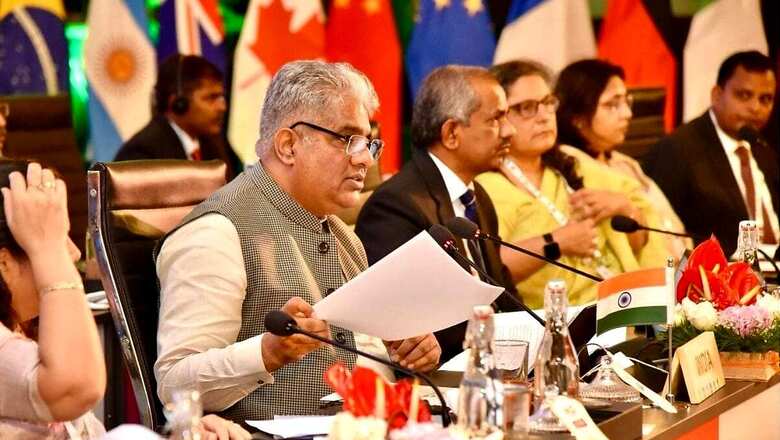
views
Even as the world witnessed its hottest summer on record, the G20 responsible for 80 per cent of the world’s emissions struggled to reach consensus on key climate areas. Despite the Indian presidency’s persistent efforts to achieve ambitious outcomes, the G20 climate ministerial talks ended in Chennai with no conclusive agreement on scaling up emission reduction targets.
The member countries unanimously adopted an outcome document agreeing on 62 of the 66 paragraphs, barring the last four with members’ divergent views on scaling up energy transition and emission reduction and how to reflect them in this document. There was no agreement on the call by some member countries for global peaking of emissions by 2025, and reduction in emissions by 60 per cent by 2035 over 2019 levels.
“The document rightly acknowledges that the efforts are insufficient to limit the global temperatures to 1.5℃. However, given how the world is impacted by increasing incidences of heatwaves and floods, we are sitting on a ticking bomb. The transition should be fair, just and equitable, but we need increased commitments and more importantly increased implementation of energy transition across sectors,” said Vibhuti Garg, Director, South Asia, Institute for Energy Economics and Financial Analysis.
The intense negotiations concluded on Friday with the last Environment and Climate Sustainability Working Group and Environment and Climate Ministers meeting. Over 225 delegates, including 41 ministers from G20 member and guest countries participated in the two-day meeting. There were representatives of 23 international organisations, including UNEP, UNFCCC, UNCCD as well as COP28.
The countries also discussed gaps in climate scenarios and models, depleting carbon budgets, historical, current and projected emissions, and emphasised the need for actions for reducing non-CO2 greenhouse gas emissions including methane by 2030.
COP28 PREZ IMPLORES G20 TO ACT
In a late plea on Thursday, COP28 president Sultan Al Jaber and UN climate change executive secretary Simon Stiell had implored G20 nations to agree to targets on phasing down fossil fuels and tripling clean energy.
“Leadership by the G20 is indispensable to enable an inclusive and ambitious development agenda that demonstrates to the world that the transformation towards a net-zero comes with great benefits,” he said.
Though the environment ministers discussed tripling renewable energy capacity, the phasing down of unabated fossil fuel, doubling energy efficiency at the meeting, there was no agreement on this.
The member countries also agreed to submit the next round of Nationally Determined Contributions (NDCs) informed by the outcomes of the global stocktake. There were other statements reiterating the need to limit temperature rise to 1.5℃ and recognising the IPCC Synthesis report. It also acknowledged that impacts of climate change will be much lower at a temperature increase of 1.5°C compared with 2°C and reiterate our resolve to pursue further efforts to limit the increase to 1.5°C.
KEY POSITIVE OUTCOMES
Representing the meeting, Union environment minister Bhupender Yadav encouraged collaboration among nations in tackling the complex and interconnected challenges of climate change towards a sustainable and resilient future.
Despite other differences, the G20 successfully adopted positive measures on deforestation, blue economy, circular economy, ecosystem restoration, halting and reversing biodiversity loss, water management and combatting plastic pollution.
In a landmark move, all member countries also adopted an outcome document on ‘Chennai High Level Principles for a Sustainable and Resilient Blue/Ocean-based Economy’. It aims at encouraging conservation, protection, and responsible use of ocean resources, while enhancing resilience against climate impacts. Yadav also highlighted that the launch of an industry-led Resource Efficiency and Circular Economy Industry Coalition (RECEIC) also marked a significant milestone under India’s G20 presidency.
However, as the world gears up for the first-ever Global Stocktake for climate action at the upcoming COP28 in November, experts asserted that it is crucial for G20 nations to significantly raise their ambition, and India has an opportunity to drive the new engine of the global economy by leading the Leaders’ summit in September to course correct climate action.
“India must persist in applying pressure throughout the upcoming deliberations to ensure a meaningful outcome,” remarked Aarti Khosla, Director, Climate Trend.















Comments
0 comment